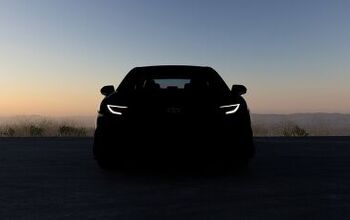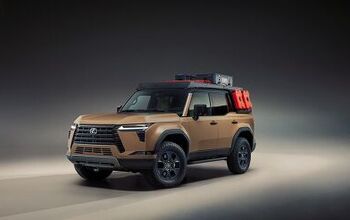Furious Chinese Hyundai Dealers, With Only One Car to Sell, Suing Automaker for $135 Million

Would you be furious if you invested millions to open a dealership, only for the manufacturer to supply just one vehicle with any sort of consistency? Of course you’d be.
That’s the problem some Hyundai dealers in China are facing now, who are in the unique situation of competing with another set of Hyundai dealers in the country. That’s a tall order: the only vehicle Hyundai supplies to those dealers on a regular basis is the Veloster hatchback. Now Hyundai has a Little Problem in Big China in the form of a $135 million lawsuit.
According to Reuters, two sales channels exist in China to sell Hyundai vehicles.
One sales channel, which has its own dealer network, is supplied by a local joint venture between Hyundai and Beijing Automotive Group (BAIC), called Beijing Hyundai Motor Co., Ltd. That channel sells Hyundais produced at its four plants in China, which the company plans to expand to six plants before the end of next year.
The other sales channel, which also has its own dealer network, only sells imported Hyundais supplied by the automaker in South Korea. Hyundai routinely supplies dealers with the Veloster hatchback, claims a dealer leading a $135 million lawsuit against Hyundai, but that’s it. Imports of other vehicles sold by the dealer network, such as the Genesis Sedan and Santa Fe XL, are infrequent.
“We sell cars, if you don’t give us cars, naturally we won’t be able to go on, we’ll close,” Wang Rongzhen, the dealer leading the charge, said in an interview with Reuters.
The Veloster is one of just a few vehicles that aren’t produced in China by Hyundai. Import dealers only account for 1 percent of Hyundai’s total sales in the country, claims Hyundai.
Because of these dire circumstances, half of Hyundai’s import-only dealer network has shuttered since 2014, claims the China Auto Dealers Chamber of Commerce, a group of dealers that are helping Hyundai’s import-only dealers with the lawsuit. Hyundai says its holding informal talks with the dealer network in efforts to come to an amicable solution.
The row between Hyundai and its Chinese dealer network occurs against the backdrop of slowing sales growth in the country over the last two years. BMW paid out $820 million to its cash-strapped Chinese dealers last year, reports Reuters.
[Image: Hyundai]

More by Mark Stevenson
Latest Car Reviews
Read moreLatest Product Reviews
Read moreRecent Comments
- Theflyersfan Expect a press report about an expansion of VW's Mexican plant any day now. I'm all for worker's rights to get the best (and fair) wages and benefits possible, but didn't VW, and for that matter many of the Asian and European carmaker plants in the south, already have as good of, if not better wages already? This can drive a wedge in those plants and this might be a case of be careful what you wish for.
- Jkross22 When I think about products that I buy that are of the highest quality or are of great value, I have no idea if they are made as a whole or in parts by unionized employees. As a customer, that's really all I care about. When I think about services I receive from unionized and non-unionized employees, it varies from C- to F levels of service. Will unionizing make the cars better or worse?
- Namesakeone I think it's the age old conundrum: Every company (or industry) wants every other one to pay its workers well; well-paid workers make great customers. But nobody wants to pay their own workers well; that would eat into profits. So instead of what Henry Ford (the first) did over a century ago, we will have a lot of companies copying Nike in the 1980s: third-world employees (with a few highly-paid celebrity athlete endorsers) selling overpriced products to upper-middle-class Americans (with a few urban street youths willing to literally kill for that product), until there are no more upper-middle-class Americans left.
- ToolGuy I was challenged by Tim's incisive opinion, but thankfully Jeff's multiple vanilla truisms have set me straight. Or something. 😉
- ChristianWimmer The body kit modifications ruined it for me.


































Comments
Join the conversation
The Chinese economy sounds like the wild, wild East.
The plan is simple. Rebadge all Hyundai's as Hellcat. They'll have no more problems waiting for cars then. Hellcats are so hot, they have to wait a year before they get them. Sell the hype. Hellcat Velostercat available with optional Scratch Pack...when you get the itch, use the optional scratcher given to everyone that placed a deposit for a new Hellcat. It's to remind you that being catty is a lifestyle.